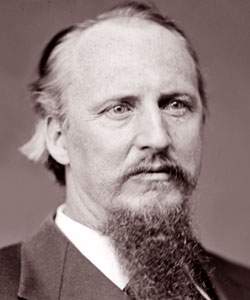Francis Marion Cockrell (American National Biography)
Scholarship
At the outbreak of the Civil War, Cockrell, a slaveowner, organized a company of pro-southern Home Guards and was elected its captain. The group joined the army raised by Sterling Price to resist the Union occupation of Missouri and fought with him at Wilson's Creek (10 Aug. 1861) and Lexington (14-20 Sept. 1861). In December the Missouri Home Guard became officially part of the Provisional Army of the Confederate States, and Cockrell received a Confederate commission as captain. His company participated in the battle of Pea Ridge (7-8 Mar. 1862) and then was transferred with other Missouri troops to Mississippi. Cockrell gained promotion to lieutenant colonel on 12 May and to colonel on 20 June and was given regimental command. His regiment engaged that fall in the battles of Iuka (19 Sept.) and Corinth (3-4 Oct.) before retiring to the Vicksburg area, where they were involved in all of the major battles of that campaign.
Cockrell was promoted to brigadier general in the aftermath of Vicksburg's surrender. Following his parole and exchange, he received the command of the reorganized First Missouri Brigade, which he led throughout the remainder of the war. His brigade served in Mississippi and Alabama during the latter half of 1863 and early 1864. In May 1864 Cockrell's brigade joined General Joseph E. Johnston's forces opposite Union general William T. Sherman in the defense of northern Georgia and Atlanta, during which Cockrell was wounded at the battle of Kennesaw Mountain (27 June).
Cockrell was promoted to brigadier general in the aftermath of Vicksburg's surrender. Following his parole and exchange, he received the command of the reorganized First Missouri Brigade, which he led throughout the remainder of the war. His brigade served in Mississippi and Alabama during the latter half of 1863 and early 1864. In May 1864 Cockrell's brigade joined General Joseph E. Johnston's forces opposite Union general William T. Sherman in the defense of northern Georgia and Atlanta, during which Cockrell was wounded at the battle of Kennesaw Mountain (27 June).
William E. Parrish, "Cockrell, Francis Marion," American National Biography Online, February 2000, http://www.anb.org/articles/04/04-00247.html.
Francis Marion Cockrell (Congressional Biographical Directory)
Reference
COCKRELL, Francis Marion, (brother of Jeremiah Vardaman Cockrell), a Senator from Missouri; born in Warrensburg, Johnson County, Mo., October 1, 1834; attended the common schools; graduated from Chapel Hill College, Lafayette County, Mo., in July 1853; studied law; admitted to the bar in 1855 and practiced in Warrensburg, Mo.; served in the Confederate Army as captain, brigade commander, and brigadier general; captured at Fort Blakeley, Ala., in April 1865 and paroled in May 1865; at the close of the Civil War resumed the practice of law; elected as a Democrat to the United States Senate in 1874; reelected four times and served from March 4, 1875, to March 3, 1905; chairman, Committee on Claims (Forty-sixth Congress), Committee on Engrossed Bills (Fifty-first through Fifty-eighth Congresses, except for Fifty-third), Committee on Appropriations (Fifty-third Congress); appointed by President Theodore Roosevelt a member of the Interstate Commerce Commission 1905-1910; appointed in 1911 a United States commissioner to reestablish the boundary line between Texas and New Mexico; civilian member of the board of ordnance in the War Department, which position he held until his death in Washington, D.C., December 13, 1915; interment in Warrensburg Cemetery, Warrensburg, Mo.
"Cockrell, Francis Marion," Biographical Directory of the United States Congress, 1774 to Present, http://bioguide.congress.gov/scripts/biodisplay.pl?index=C000576.



